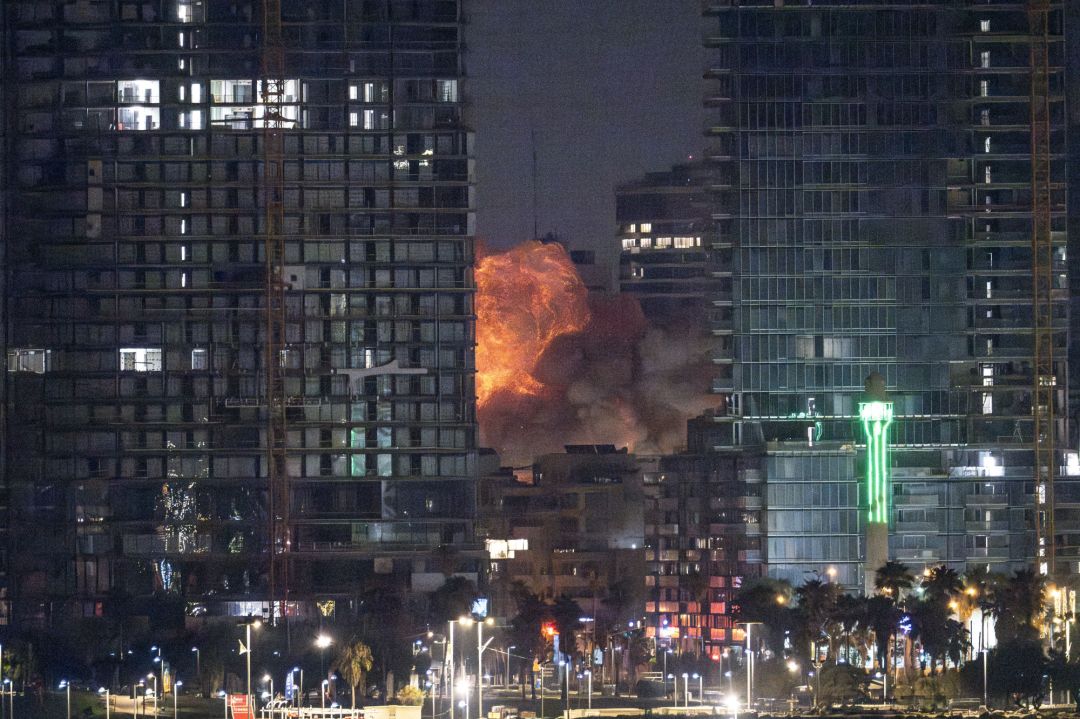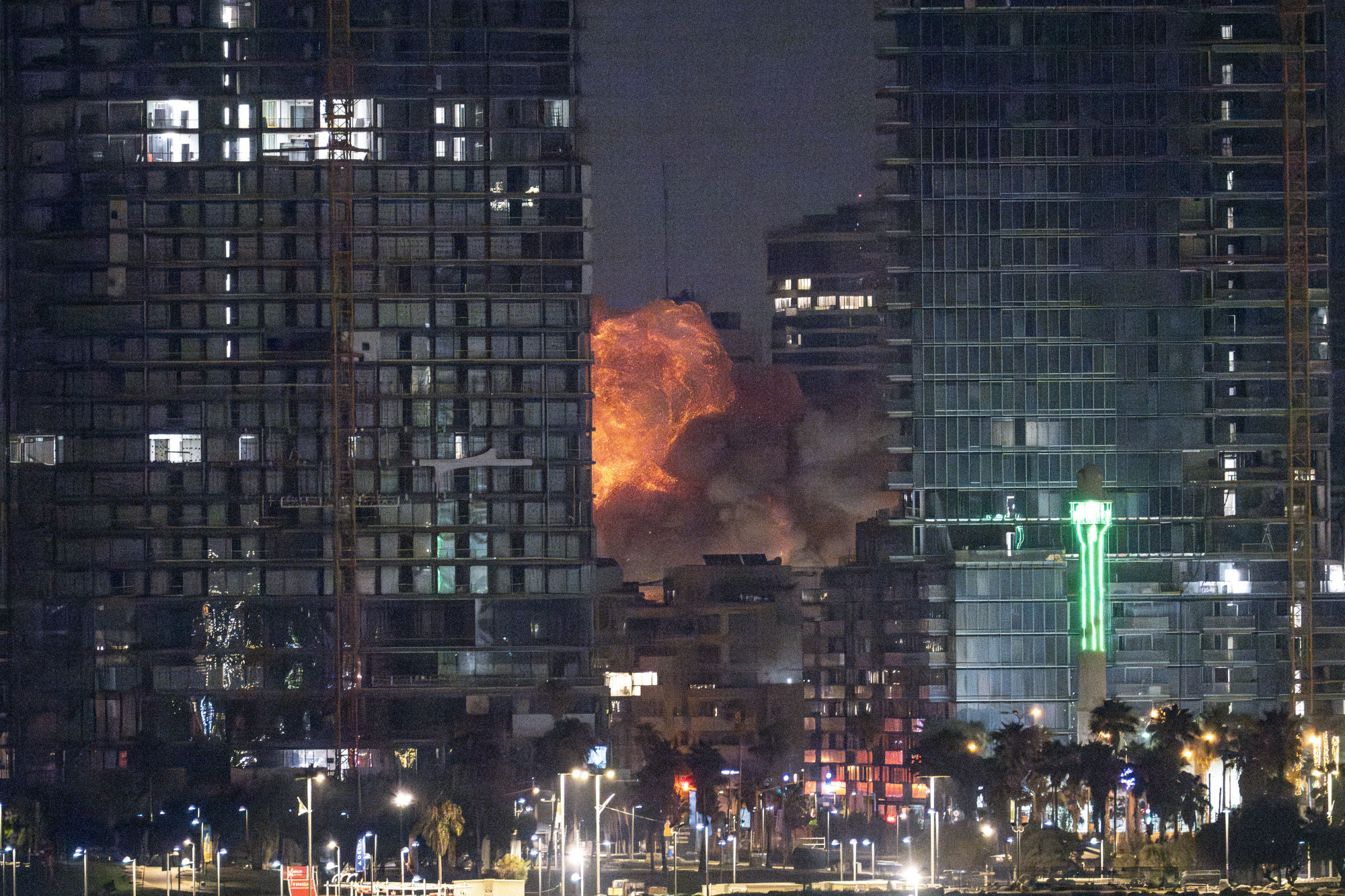Yesterday morning, as families in central Israel emerged from bomb shelters after yet another sleepless night, the air was once again rent by sirens and the thunder of incoming missiles. Fires ignited across multiple cities. In Petah Tikva, a building lay smouldering from a direct hit. In Haifa, Iranian missiles struck near the port, severely damaging a power facility and forcing Bazan, Israel’s major oil refining and petrochemicals company, to suspend activity at all its plants. With grim efficiency, medics and emergency teams scrambled to locate survivors. It was the largest barrage of the war so far – around 100 ballistic missiles launched in a single salvo. And yet, amid the wreckage, Israel stood upright.
Israel, for all its high technology and military prowess, fights this war not merely as a state but as the embodiment of a people
That barrage marked the fourth day of Operation Rising Lion, the name given to Israel’s air campaign, which has shifted the strategic centre of gravity into the heart of Iran. Over 250 targets have been struck in Tehran alone. Nuclear facilities, intelligence headquarters, ballistic missile sites, oil fields, and command centres have been devastated in coordinated strikes. Top Iranian generals, including Brigadier General Mohammad Kazemi and his deputy, have been killed. Explosions and air defence activity have now been reported in Mashhad, Isfahan, and across the road to Qom. Yesterday, the IDF Spokesperson, Brigadier General Effie Defrin, stated that Israel had destroyed one third of the Iranian regime’s surface-to-surface missile launchers and achieved full aerial operational control above Tehran.
But Israel is not the only actor with staying power.
The regime it now faces is one that reveres patience as a sacred principle. For 46 years, the Islamic Republic has bled its own people without flinching, executing, imprisoning, and terrorising Iranians in service of a messianic worldview rooted in Twelver Shiism. It neither dreads death nor shuns devastation. On the contrary, it thrives in crisis. Chaos is a doctrine, martyrdom a tactic. It is centred on the belief in a divinely guided line of twelve Imams, culminating in the hidden Imam, Muhammad al-Mahdi, who is expected to reappear to establish justice. This messianic theology infuses the regime with a potent mix of fatalism and militancy.
Western diplomats often treat Iran as a ‘normal state’. But Iran sees itself as a sacred revolutionary project with a divine mission. This explains its willingness to wait decades to achieve strategic goals, its hostility to compromise – especially with Israel or the US – and its dual language: rational diplomacy abroad, apocalyptic zeal at home. The same regime that once sent children into minefields during the Iran-Iraq war now launches missiles at Israeli children in Bat Yam and Tamra.
Twenty-four civilians have been killed in Iranian missile strikes on Israel, including several children. Hundreds more have been wounded. And yet, even now, the streets of Israeli cities do not empty. Medics operate under fire. Firefighters contain blazes ignited by hypersonic missiles. Citizens comply with civil defence instructions and emerge, again and again, to rebuild and restore. Beyond that, people still go to the shops, to work, and even to the beach. This is not only a display of operational competence. It is a demonstration of national will.
Israel, for all its high technology and military prowess, fights this war not merely as a state but as the embodiment of a people. It is a people that has internalised, across centuries of exile and persecution, a simple truth: no one else will fight their wars for them. When Prime Minister Netanyahu stated that ‘everything they’ve experienced until now will be nothing compared to what they will feel in the coming days,’ he was not offering bluster. He was signalling resolve rooted not in vengeance, but in existential necessity.
That necessity has grown more acute. Just past midnight last night, the IDF reported that missiles were once again launched from Iran toward Israeli territory. Defensive systems engaged. The Home Front Command ordered civilians to remain in shelters. By around 2 a.m., renewed Israeli airstrikes hit Iran’s Natanz nuclear enrichment facility. And around 4.30 a.m., Iran fired another small wave – single-digit numbers, likely cruise missiles. No impacts were recorded. Some interpret this as a sign of depletion, others as a change in tactics.
In Tehran, unrest and disarray are growing. Internet service has collapsed in parts of the capital. Footage circulating online shows protests continuing. The IDF released news this morning documenting waves of Israeli airstrikes overnight in western Iran, targeting dozens of missile launch sites, drone storage facilities, and surface to air missile launchers. The Islamic Revolutionary Guard Corps (IRGC) spokesman had earlier announced the ninth wave of what Iran calls ‘Operation True Promise III’, declaring it would continue until dawn. But last night’s retaliatory attacks were minimal, sporadic, and largely ineffective.
The campaign against Iran’s nuclear and military infrastructure has already achieved tactical depth. At Isfahan, strikes reportedly disabled a uranium conversion facility and a fuel fabrication plant. The IAEA has warned of cascading technical setbacks. Several nuclear scientists are confirmed dead. But Fordow – the most fortified site – remains. It is widely acknowledged that only the United States possesses the bunker-busting capability to strike it.
The United States has not joined Israel militarily. Yet President Trump did order the deployment of the USS Nimitz carrier group overnight. Last night, Trump convened the National Security Council in the White House situation room, having left the G7 summit early. French President Macron claimed Trump had departed to work on a ceasefire. Trump rebuked this claim on his Truth social platform: ‘Wrong! He has no idea why I am now on my way to Washington, but it certainly has nothing to do with a Cease Fire. Much bigger than that.’
Indeed, Trump has issued a series of declarations, consistent in message if escalating in tone. ‘IRAN CAN NOT HAVE A NUCLEAR WEAPON,’ he wrote. ‘Everyone should immediately evacuate Tehran!’ He added, ‘I gave Iran 60 days and they said no, and the 61st you saw what happened.’ Asked whether Israel could destroy Iran’s nuclear capability without American support, he replied, ‘It’s irrelevant, something’s going to happen.’ Secretary of Defense Pete Hegseth struck a less Trumpian diplomatic tone: ‘We are postured defensively in the region to be strong in pursuit of a peace deal, and we certainly hope that’s what happens here.
Curiously, even late-night pizza orders seem to signal something. Two restaurants near the Pentagon, District Pizza Palace and We, The Pizza, have recorded unusually high demand two nights running, according to publicly available Google data. That may seem trivial, but it suggests a headquarters still bustling deep into the night – perhaps drafting contingency plans for a war it insists it is not yet part of
And so, the enemy may be fanatical. But Israel, too, knows endurance. Not for messianic reward or imperial ambition, but for children asleep in shelters, for families huddled in stairwells, for the memory of pogroms and gas chambers, and for the unyielding belief that Jewish life is worth defending at any cost. Israel’s resilience is rooted not in apocalypse, but in survival, self-reliance, and a moral obligation to outlive its enemies. Israel’s will remains unbroken, but its means may soon face a critical test. Whether the United States will intervene militarily is a live and looming decision.
As Israelis receive yet another warning alert this morning and prepare to enter shelters, the quiet power of that resilience continues to define this war. Iran may fight for apocalypse. Israel fights for tomorrow. And that is the unshakable difference that may yet shape the outcome.









Comments